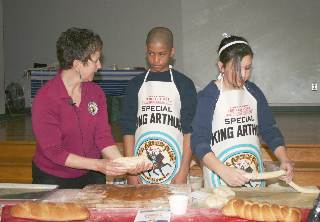If

you’re a teacher, the education news can be pretty much a downer these days. It seems awfully political, cynical, and detached from what happens with kids in the classroom. So if you’re down and troubled and need a helping hand, I’m offering up a some education easy reading tonight with a story where everything turns out right.
Susie Hamlin, who is a middle school Family and Consumer Science in St. Louis, was an NBPTS candidate when she first contacted me. I offered to be a reader for her entries. As is so often the case, when I offer to help a colleague I’m usually the one who benefits the most. Thanks to Susie, I discovered that King Arthur Flour Company would partner with schools and bring their Life Skills Bread Baking Project to schools and communities.
The deal was this: King Arthur would send a representative to do an assembly, demonstrating how to make bread and connecting it to science concepts. Every child would be sent home with supplies to bake two loaves of bread. The only stipulation was that students were asked to return one of the two loaves to contribute to a local food insufficiency program.
You always wonder how these things will play out. Will the presentation be any good? How commercial is this going to be? Will the kids behave? Will they want to take home flour and bake bread? Will they bring it back? Will the bread be edible?
Paula Grey, the King Arthur representative, had asked me to have three student helpers ready for the assembly. She handed one her camera and ask her to get a lot of good shots. She told the other two that they’d be helping her make bread and just to relax and follow her instructions. What impressed me was her confidence in students she didn’t know doing something they’d never done before. And sure enough as two of their peers measured and mixed and kneaded and shaped, the rest of the seventh grade was quiet and observant. Paula didn’t push product, she pushed the satisfaction of competence to do something that looked complicated and commitment to contribute to one’s community. At the end of the day about 75% of the seventh graders came down to pick up a baking kit.
..... But would they bake? Middle school kids are not generally known for their ability to remember commitments or for their altruism. Would close 1,000 pounds of flour make it home without incident? Would the parents let them try? Would the kids follow through? Would the bread be edible? What if we only got a dozen loaves back?
I worried most of the weekend, but on Monday, the bread came back. Loaves and loaves of bread that filled the table and the counter brought in by kids wanting to share their stories about who they baked with and how they solved their problems and what they thought of their finished product and when they were going to make bread again. They had tried something that seemed hard, they had done it themselves, and they had produced a tangible product that had real benefit to themselves and someone else as a result. They had learned something that mattered and they had taught themselves.
Sometimes school just really seems hard and almost hopeless for teachers and for students. But sometimes as teachers we have a chance to invest more in empowering our students than fixing them. Sometimes kids discover that contributing can be as rewarding as competing. And most times, I still believe that even when times are hard it’s worth the effort.
Hey have you ever tried, Really reaching out for the other side? I may be climbing on rainbows But, baby here goes. I want to make it with you I really think that we can make it.

And a few of you might even recall that was recorded back in 1970 by a group called Bread!